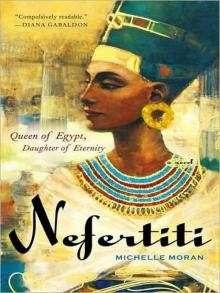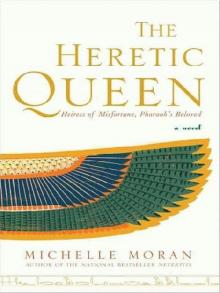- Home
- Michelle Moran
The Heretic Queen Page 2
The Heretic Queen Read online
Page 2
“Don’t worry, Nefer.” Asha patted my shoulder the way an older brother might have. “I’m sure you’ll make friends.”
He crossed the hall, and I watched him greet his father at the generals’ table. Soon, I thought, he’ll be one of those men, wearing his braided hair in a small loop at the back of his neck, never going anywhere without his sword.When Asha said something to make his father laugh, I thought of my mother, Queen Mutnodjmet. If she had survived, this would have been her court, filled with her friends, and viziers, and laughter. Women would never dare to whisper about me, for instead of being a spare princess, I’d be the princess.
I took my place next to Woserit, and a prince from Hatti smiled across at me. The three long braids that only Hittites wore fell down his back, and as the guest of honor, his chair had been placed to the right of Henuttawy. Yet no one had remembered the Hittite custom of offering bread to the most important guest first. I took the untouched bowl and passed it to him.
He was about to thank me when Henuttawy placed her slender hand on his arm and announced, “The court of Egypt is honored to host the prince of Hatti as a guest at my nephew’s coronation.”
The viziers, along with everyone at the table, raised their cups, and when the prince made a slow reply in Hittite, Henuttawy laughed. But what the prince said hadn’t been funny. His eyes searched the table for help, and when no one came to his aid, he looked at me.
“He is saying that although this is a happy day,” I translated, “he hopes that Pharaoh Seti will live for many years and not leave the throne of Lower Egypt to Ramesses too soon.”
Henuttawy paled, and at once I saw that I was wrong to have spoken.
“Intelligent girl,” the prince said in broken Egyptian.
But Henuttawy narrowed her eyes. “Intelligent? Even a parrot can learn to imitate.”
“Come, Priestess. Nefertari is quite clever,” Vizier Anemro offered. “No one else remembered to pass bread to the prince when he came to the table.”
“Of course she remembered,” Henuttawy said sharply. “She probably learned it from her aunt. If I recall, the Heretic Queen liked the Hittites so much she invited them to Amarna where they brought us the plague. I’m surprised our brother even allows her to sit among us.”
Woserit frowned. “That was a long time ago. Nefertari can’t help who her aunt was.” She turned to me. “It’s not important,” she said kindly.
“Really?” Henuttawy gloated. “Then why else would Ramesses consider marrying Iset and not our princess?” I lowered my cup, and Henuttawy continued. “Of course, I have no idea what Nefertari will do if she’s not to become a wife of Ramesses. Maybe you could take her in, Woserit.” Henuttawy looked to her younger sister, the High Priestess of the cow goddess Hathor. “I hear that your temple needs some good heifers.”
A few of the courtiers at our table snickered, and Henuttawy looked at me the way a snake looks at its dinner.
Woserit cleared her throat. “I don’t know why our brother puts up with you.”
Henuttawy held out her hand to the Hittite prince, and both of them stood to join the dancing. When the music began, Woserit leaned close to me. “You must be careful around my sister now. Henuttawy has many powerful friends in the palace, and she can ruin you in Thebes if that’s what she wishes.”
“Because I translated for the prince?”
“Because Henuttawy has an interest in seeing Iset become Chief Wife, and there has been talk that this was a role Ramesses might ask you to fill. Given your past, I should say it’s unlikely, but my sister would still be more than happy to see you disappear. If you want to continue to survive in this palace, Nefertari, I suggest you think where your place in it will be. Ramesses’s childhood ended tonight, and your friend Asha will enter the military soon. What will you do? You were born a princess and your mother was a queen. But when your mother died, so did your place in this court. You have no one to guide you, and that’s why you’re allowed to run around wild, hunting with the boys and tugging Ramesses’s hair.”
I flushed. I had thought Woserit was on my side.
“Oh, Pharaoh Seti thinks it is cute,” she admitted. “And you are. But in two years that kind of behavior won’t be so charming. And what will you do when you’re twenty? Or thirty even? When the gold that you’ve inherited is spent, who will support you? Hasn’t Paser ever spoken about this?”
I steadied my lip with my teeth. “No.”
Woserit raised her brows. “None of your tutors?”
I shook my head.
“Then you still have much to learn, no matter how fluent your Hittite.”
THAT EVENING, as I undressed for bed, my nurse remarked on my unusual silence.
“What? Not practicing languages, my lady?” She poured warm water from a pitcher into a bowl, then set out a cloth so I could wash my face.
“What is the point of practicing?” I asked. “When will I use them? Viziers learn languages, not spare princesses. And since a girl can’t be a vizier . . .”
Merit scraped a stool across the tiles and sat next to me. She studied my face in the polished bronze, and no nurse could have been more different from her charge. Her bones were large, whereas mine were small, and Ramesses liked to say that whenever she was angry her neck swelled beneath her chin like a fat pelican’s pouch. She carried her weight in her hips and her breasts, whereas I had no hips and breasts at all. She had been my nurse from the time my mother had died in childbirth, and I loved her as if she were my own mawat. Now, her gaze softened as she guessed at my troubles. “Ah.” She sighed deeply. “This is because Ramesses is going to marry Iset.”
I glanced at her in the mirror. “Then it’s true?”
She shrugged. “There’s been some talk in the palace.” As she shifted her ample bottom on the stool, faience anklets jangled on her feet. “Of course, I had hopes that he was going to marry you.”
“Me?” I thought of Woserit’s words and stared at her. “But why?”
She took back my cloth and wrung it out in the bowl. “Because you are the daughter of a queen, no matter your relationship to the Heretic and his wife.” She was referring to Nefertiti and her husband, Akhenaten, who had banished Egypt’s gods and angered Amun. Their names were never spoken in Thebes. They were simply The Heretics, and even before I had understood what this meant, I had known that it was bad. Now, I tried to imagine Ramesses looking at me with his wide blue eyes, asking me to become his wife, and a warm flush crept over my body. Merit continued, “Your mother would have expected to see you married to a king.”
“And if I don’t marry?” After all, what if Ramesses didn’t feel the same way about me as I felt about him?
“Then you will become a priestess. But you go every day to the Temple of Amun, and you’ve seen how the priestesses live,” she said warningly, motioning for me to stand with her. “There wouldn’t be any fine horses or chariots.”
I raised my arms, and Merit took off my beaded dress. “Even if I were a High Priestess?”
Merit laughed. “Are you already planning for Henuttawy’s death?”
I flushed. “Of course not.”
“Well, you are thirteen. Nearly fourteen. It’s time to decide your place in this palace.”
“Why does everyone keep telling me this tonight?”
“Because a king’s coronation changes everything.”
I put on a fresh sheath, and when I climbed into bed, Merit looked down at me.
“You have eyes like Tefer,” she said tenderly. “They practically glow in the lamplight.” My spotted miw curled closer to me, and when Merit saw us together she smiled. “A pair of green-eyed beauties,” she said.
“Not as beautiful as Iset.”
Merit sat herself on the edge of my bed. “You are the equal of any girl in this palace.”
I rolled my eyes and turned my face away. “You don’t have to pretend. I know I’m nothing like Iset—”
“Iset is three years older than you. I
n a year or two, you will be a woman and will have grown into your body.”
“Asha says I’ll never grow, that I’ll still be as short as Seti’s dwarfs when I’m twenty.”
Merit pushed her chin inward so that the pelican’s pouch wagged angrily. “And what does Asha think he knows about dwarfs? You will be as tall and beautiful as Isis one day! And if not as tall,” she added cautiously, “then at least as beautiful. What other girl in this palace has eyes like yours? They’re as pretty as your mother’s. And you have your aunt’s smile.”
“I’m nothing like my aunt,” I said angrily.
But then, Merit had been raised in the court of Nefertiti and Akhenaten, so she would know if this were true. Her father had been an important vizier, and Merit had been a nurse to Nefertiti’s children. In the terrible plague that swept through Amarna, Merit lost her family and two of Nefertiti’s daughters in her care. But she never spoke about it to me, and I knew she wished to forget this time twenty years ago. I was sure, as well, that Paser had taught us that the High Priest Rahotep had also served my aunt once, but I was too afraid to confirm this with Merit. This is what my past was like for me. Narrowed eyes, whispering, and uncertainty. I shook my head and murmured, “I am nothing like my aunt.”
Merit raised her brows. “She may have been a heretic,” she whispered, “but she was the greatest beauty who ever walked in Egypt.”
“Prettier than Henuttawy?” I challenged.
“Henuttawy would have been cheap bronze to your aunt’s gold.”
I tried to imagine a face prettier than Henuttawy’s, but couldn’t do it. Secretly I wished that there was an image of Nefertiti left in Thebes. “Do you think that Ramesses will choose Iset because I am related to the Heretic Queen?”
Merit pulled the covers over my chest, prompting a cry of protest from Tefer. “I think that Ramesses will choose Iset because you are thirteen and he is seventeen. But soon, my lady, you will be a woman and ready for whatever future you decide.”
CHAPTER TWO
THREE LINES OF CUNEIFORM
EVERY MORNING for the past seven years I had walked from my chamber in the royal courtyard to the small Temple of Amun by the palace. And there, beneath the limestone pillars, I had giggled with other students of the edduba while Tutor Oba shuffled up the path, using his walking stick like a sword to beat back anyone who stood in his way. Inside, the temple priests would scent our clothes with sacred kyphi, and we would leave smelling of Amun’s daily blessing. Ramesses and Asha would race me to the whitewashed schoolhouse beyond the temple, but yesterday’s coronation changed everything. Now Ramesses would be gone, and Asha would feel too embarrassed to race. He would tell me he was too old for such things. And soon, he would leave me as well.
When Merit appeared in my chamber, I followed her glumly into my robing room, lifting my arms while she fastened a linen belt around my kilt.
“Myrtle or fenugreek today, my lady?”
I shrugged. “I don’t care.”
She frowned at me and fetched the myrtle cream. She opened the alabaster jar with a twist, then spread the thick cream over my cheeks. “Stop making that face,” she reprimanded.
“What face?”
“The one like Bes.”
I suppressed a smile. Bes was the dwarf god of childbirth; his hideous grimace scared Anubis from dragging newborn children away to the Afterlife.
“I don’t know what you have to sulk about,” Merit said. “You won’t be alone. There’s an entire edduba full of students.”
“And they’re only nice to me because of Ramesses. Asha and Ramesses are my only real friends. None of the girls will go hunting or swimming.”
“Then it’s lucky for you that Asha is still in the edduba.”
“For now.” I took my schoolbag grudgingly, and as Merit saw me off from my chamber she called, “Scowling like Bes will only scare him away sooner!”
But I wasn’t in the mood for her humor. I took the longest path to the edduba, through the eastern passageway into the shadowed courtyards at the rear of the palace, then along the crescent of temples and barracks that separated Malkata from the hills beyond. I have often heard the palace compared to a pearl, perfectly protected within its shell. On one side are the sandstone cliffs, on the other is the lake that had been carved by my akhu to allow boats to travel from the River Nile to the very steps of the Audience Chamber. Amunhotep III built it for his wife, Queen Tiye. When his architects had said that such a thing could never be made, he designed it himself. With his legacy before me, I walked slowly around the Arena, past the barracks with their dusty parade grounds, and then beyond the servants’ quarters that squatted back into the wadis to the west. When I came to the lakeshore, I approached the water to peer at my reflection.
I don’t look anything like Bes, I thought. For one, he has a much bigger nose than I do. I made the grimace that all artists carve on statues of Bes, and behind me someone laughed.
“Are you admiring your teeth?” Asha cried. “What kind of face was that?”
I glared at him. “Merit says I have a face like Bes.”
Asha stepped back to scrutinize me. “Yes, I can see the resemblance. You both have big cheeks, and you are rather short.”
“Stop it!”
“I wasn’t the one making the face!” We continued our walk to the temple and he asked, “So did Merit tell you the news last night? Ramesses will probably marry Iset.”
I looked away and didn’t reply. In the heat of Thoth, the sun cast its rays across the lake like a golden fisherman’s net. “If Ramesses was going to be married,” I said finally, “why wouldn’t he tell us about it himself?”
“Perhaps he isn’t certain. After all, it’s Pharaoh Seti who will ultimately decide.”
“But she isn’t a match for Ramesses at all! She doesn’t hunt, or swim, or play Senet. She can’t even read Hittite!”
Tutor Oba glared as we approached the courtyard, and under his breath Asha whispered, “Prepare for it!”
“How nice of the two of you to join us!” Oba exclaimed. Two hundred faces turned in our direction, and Tutor Oba lashed out at Asha with his stick. “Get in line!” He caught Asha on the back of the leg, and we scampered to join the other students. “Do you think that Ra appears in his solar bark when he feels like it? Of course not! He’s on time. Every sunrise he’s on time!”
Asha glanced over his shoulder at me in line as we followed Tutor Oba into the sanctuary. Cloth mats had been spread out for us on the floor, and we took our seats and waited for the priests. I whispered to Asha, “I’ll bet Ramesses is sitting in the Audience Chamber right now, wishing he was with us.”
“I don’t know. He’s safe from Tutor Oba.”
I snickered as seven priests entered the chamber, swinging incense from bronze holders and intoning the morning hymn to Amun.
Hail to thee, Amun-Ra, Lord of the thrones of the earth, the oldest existence, ancient of heaven, support of all things.
Chief of the gods, lord of truth; maker of all things above and below.Hail to thee.
As the incense filled the room, a student coughed. Tutor Oba turned around to look fiercely at him and I elbowed Asha in the side, bent my mouth into a mean, angry line, then imitated Oba’s snarling. One of the students laughed out loud, and Tutor Oba twisted around. “Asha and Princess Nefertari!” he snapped.
Asha glared at me and I giggled. But outside the temple, I didn’t ask him to race me to the edduba.
“I don’t know why the priests don’t throw us out,” he said.
I grinned. “Because we’re royalty.”
“You’re royalty,” Asha countered. “I’m the son of a soldier.”
“You mean the son of a general.”
“Still, I’m not like you. I don’t have a chamber in the palace or a body servant. I need to be careful.”
“But it was funny,” I prompted.
“A little,” he admitted as we reached the low white walls of the royal edduba.
The schoolhouse squatted like a fat goose on the hillside, and Asha’s footsteps slowed as we approached its open doors. “So what do you think it’ll be today?” he asked.
“Probably cuneiform.”
He sighed heavily. “I can’t afford another poor report to my father.”
“Take the reed mat next to mine, and I’ll write big enough for you to see,” I promised.
Inside the halls of the edduba, students called to one another, laughing and exchanging stories until the trumpet sounded for class. Paser stood at the front of our chamber, observing the chaos, but when Iset entered, the room grew silent. She moved through the students, and they parted before her as if a giant hand had pushed them aside. She sat across from me, folding her long legs on her reed mat the way she always did, but this time, when she swept back her dark hair, her fingers seemed fascinating to me. They were long and tapered. At court, only Henuttawy surpassed Iset’s skill with the harp. Was that why Pharaoh Seti thought she’d make a good wife?
“We may all stop staring now,” Paser announced. “Let us take out our ink. Today, we translate two of the Hittite emperor’s letters to Pharaoh Seti. As you know, Hittite is written in cuneiform, which will mean transcribing every word from cuneiform to hieroglyphics.”
I took out several reed pens and ink from my bag. When the basket of blank papyrus came to me, I took the smoothest one from the pile. Outside the edduba a trumpet blared again, and the noise from the other classrooms went silent. Paser passed out copies of Emperor Muwatallis’s first letter, and in the early morning heat the sound of pens scratching on papyrus settled upon the room. The air felt heavy, and sweat beaded behind my knees where I sat cross-legged. Two fan bearers from the palace cooled the room with their long blades, and as the air stirred, Iset’s perfume moved across the chamber to tickle my nose. She told the students she wore it to cover the unbearable smell of the ink, which is made from ash and the fat boiled off a donkey’s skin. But I knew this wasn’t true. Palace scribes mixed our ink with musk oil to cover the terrible scent. What she really wanted was to attract attention. I wrinkled my nose and refused to be distracted. The important information in the letter had been removed, and what had been left was simple to translate. I wrote several lines in large hieroglyphics on my papyrus, and when I’d finished with the letter, Paser cleared his throat.

 Madame Tussaud: A Novel of the French Revolution
Madame Tussaud: A Novel of the French Revolution Cleopatra's Daughter
Cleopatra's Daughter Rebel Queen
Rebel Queen The Second Empress: A Novel of Napoleon's Court
The Second Empress: A Novel of Napoleon's Court Mata Hari's Last Dance
Mata Hari's Last Dance Nefertiti
Nefertiti The Heretic Queen
The Heretic Queen The Egyptian Royals Collection
The Egyptian Royals Collection Cleopatra’s Daughter: A Novel
Cleopatra’s Daughter: A Novel The Second Empress
The Second Empress Madame Tussaud
Madame Tussaud